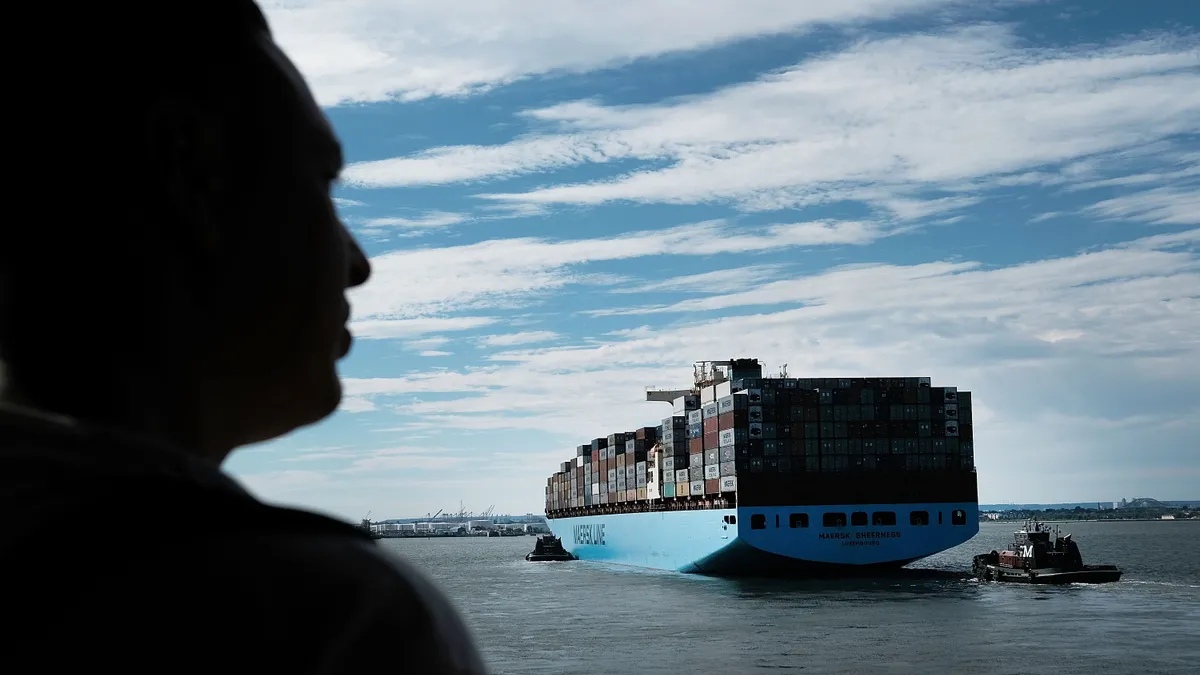Dive Brief:
- As cargo delays and long waits for berth space continue at the Port of Los Angeles and Port of Long Beach, concerns surrounding inventory for the holiday season have emerged. Russell estimates disruption on up to $90 billion worth of goods if congestion continues into October.
- The analysis from Russell showcases two scenarios modeling the disruption at both ports. Scenario one involves $49.4 billon of trade being delayed, including $4 billion of clothing. Scenario two shows $90 billion dollars of trade delayed, which includes $6.2 billion worth of clothing. The data Russell used for scenario one and two are based on 2020 figures.
- "A large demand and COVID safety protocols have created the 'perfect storm' at ports. In this situation, ships are delayed entering the ports, creating a backlog of ships waiting to enter the port resulting in time lags for the unloading of goods," said Russell Group Managing Director Suki Basi.
Dive Insight:
The cargo delays at the Port of Long Beach and Port of Los Angeles affect multiple parties in the supply chain, from terminals to drayage providers to importers. And experts don't expect a slowdown in cargo as peak season nears.
There is a "60% increase in the inbound outbound ratio at the ports of US West Coast, surpassing the pre-covid levels, indicating that there is excessive stress on the ports, and therefore indicating further congestion is expected in the coming months as we approach the holiday season in the later part of the year," Dr. Johannes Schlingmeier, co-founder and CEO of Container xChange, said in a press release.
As of Wednesday 51 vessels are scheduled to arrive at the Los Angeles/Long Beach harbor over the next 3 days, which is 14 more ships than the levels seen before the pandemic, Executive Director of Marine Exchange of Southern California Kip Louttit said in an email.
Cargo volumes have been growing for several months. The Port of Long Beach has broken cargo monthly records in 12 of the last 13 months. Through July, the port processed 5.5 million TEUs, a 32% increase over the same period last year, according to the Port of Long Beach. The Port of Los Angeles has processed 6.3 million TEUs in the 2021 calendar year.
Containers sitting at ports or in terminals exceed 30 days in some locations, according to FreightWaves. In addition, some shippers have seen delivery schedules slip six to eight weeks longer.
The American Apparel & Footwear Association in an interview with Retail Dive said a luggage company it works with typically has 11 container deliveries shipped every year by August, in time for the holiday season. So far, the company has only been able to get three of its usual 11 shipments.
Shippers as well as retailers need to adjust as they face lack of space for their cargo. "Holy crap, we might have to bring our forecast back down because we can't get containers," Toy maker Basic Fun, CEO, Jay Foreman said in an interview with Retail Dive. This was after originally raising forecast by 20% earlier in the year.
"Goods are delayed but it also has the effect of reducing the capacity in the marketplace significantly because all the ships are sitting," said Craig Grossgart, senior vice president of global ocean at Seko Logistics. "Not only does it cause delays in the products that are on those ships, but it makes it tougher to get on a ship and then sustain the pricing that exists today in the marketplace."
Companies across the supply chain are taking action to mitigate the congestion at ports. Shippers are booking in advance even if it means paying more. Carriers are doubling orders for container ships, and 3PLs likes C.H. Robinson are applying drayage surcharges at ports in Long Beach and Los Angeles.
Customers are already shifting cargo to ports along the East Coast, Gulf or Pacific Northwest. The Southern California ports play a dominant role due to their capacity, but customers at Seko Logistics have been looking at charters to transport goods.
"Everyone’s looking to put ships into any port where you can get a berth upon arrival. So people are doing all kinds of unnatural acts to keep their businesses viable," said Grossgart.













